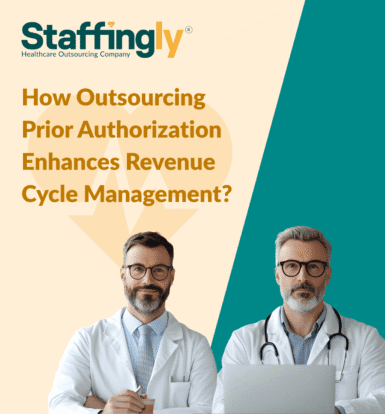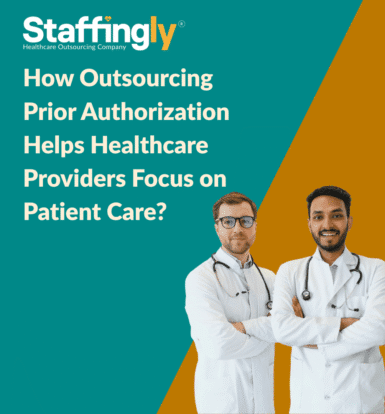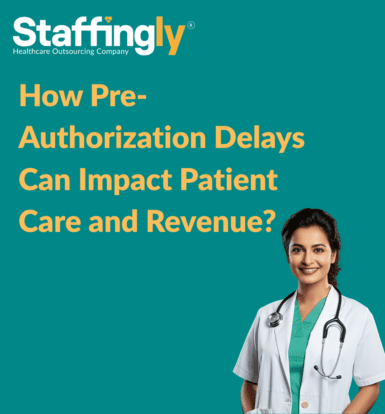On-Demand Outsourcing BPO Services for Healthcare Providers With 24/7 Coverage!
Save up to 70% on staffing costs!
Browse Specialty Staffing Services
How Can Healthcare Providers Manage Pre-Authorization Efficiently?
Pre-authorization is often seen as a necessary but frustrating hurdle in healthcare. While insurance companies’ requirements for prior approval aren’t likely to disappear soon, how healthcare providers manage this process can make all the difference. Efficient pre-authorization management can streamline workflows, reduce delays in patient care, and protect the organization’s financial health. This article explores practical best practices to transform pre-authorization from a bottleneck into a smooth, predictable part of healthcare operations. Key Takeaways Start the pre-authorization process early, ideally

How Outsourcing Prior Authorization Enhances Revenue Cycle Management?
In the U.S. healthcare system, efficient revenue cycle management (RCM) is crucial for the financial health of medical practices and healthcare units. One of the significant challenges that disrupt RCM is managing prior authorization (PA) processes. Outsourcing prior authorization services has emerged as a powerful strategy to improve cash flow, reduce claim denials, and streamline administrative workflows—ultimately enhancing the entire revenue cycle. The Impact of Prior Authorization on Revenue Cycle Management Prior authorization is a prerequisite from insurers requiring approval

How Outsourcing Prior Authorization Helps Healthcare Providers Focus on Patient Care?
In today’s complex healthcare environment, prior authorization (PA) has become a critical but time-consuming process. For doctors and healthcare units across the U.S., navigating insurance requirements, paperwork, and follow-ups can distract from the primary goal delivering quality patient care. Outsourcing prior authorization services is increasingly becoming a strategic solution to this challenge. The Burden of Prior Authorization on Healthcare Providers How outsourcing prior authorization boosts patient care by reducing the administrative burden of PA, a process insurers require to approve

How Pre-Authorization Delays Can Impact Patient Care and Revenue?
Pre-authorization is a routine but crucial step in healthcare insurance—basically, it’s the green light insurance companies give before certain treatments or tests can happen. While it’s meant to prevent unnecessary procedures and control costs, pre-authorization delays in healthcare often slow down care and frustrate both patients and providers. For emergency rooms and hospitals, these delays don’t just affect patient health—they can also seriously hit revenue and increase administrative headaches. Key Takeaways Pre-authorization delays can slow down critical treatments and worsen

How Do Oncology Practices Benefit from Prior Authorization Outsourcing?
Oncology practices face unique challenges when it comes to prior authorization (PA). With complex treatment regimens, expensive therapies, and urgent patient needs, delays in PA can significantly impact patient care and practice revenue. Outsourcing prior authorization is emerging as a strategic solution to these challenges, helping oncology practices streamline operations and focus on what matters most: patient outcomes. This article explores how oncology practices benefit from PA outsourcing, includes a real-world case study, and highlights how Staffingly Inc. supports these

Improving Healthcare Operations Through Strategic Planning and Smarter Prior Authorization
Efficient healthcare operations are essential for any medical facility to deliver timely, high-quality patient care. However, many practices across the United States still face administrative bottlenecks, with none more frustrating than the prior authorization (PA) process. To boost healthcare efficiency with smarter prior auth, strategic planning combined with intelligent workflows and expert outsourcing is the key to overcoming these challenges. The underlying issue isn’t the intent of PA but rather how it’s implemented. Unfortunately, most clinics and hospitals still rely

How Does HIPAA Influence Medical Scribing in Virginia Healthcare Facilities?
Medical scribes play a crucial role in today’s healthcare systems — they help document patient encounters in real-time, giving providers more time to focus on care. But with this convenience comes great responsibility, especially regarding patient privacy. In Virginia, as in the rest of the U.S., medical scribing practices are directly influenced by HIPAA (Health Insurance Portability and Accountability Act). Understanding HIPAA compliance for medical scribes in Virginia isn’t just about legal requirements — it’s about protecting patient trust and

How Can Rhode Island Doctors Ensure HIPAA Compliance When Handling Prior Authorizations?
Prior authorization (PA) is a necessary step in healthcare to verify that treatments or medications are covered by insurance before they are provided. However, this process often requires sharing sensitive patient information, making HIPAA compliance critical. For doctors in Rhode Island, ensuring HIPAA-compliant handling of prior authorizations protects patient privacy, avoids legal penalties, and improves workflow efficiency. This article explores how Rhode Island doctors can navigate the complexities of HIPAA regulations during prior authorization processes. We’ll discuss challenges, impacts, and
 Book a Demo to Build Your Team Today!
Book a Demo to Build Your Team Today!


 Read Case Studies
Read Case Studies 



 Virtual Medical Assistants
Virtual Medical Assistants



